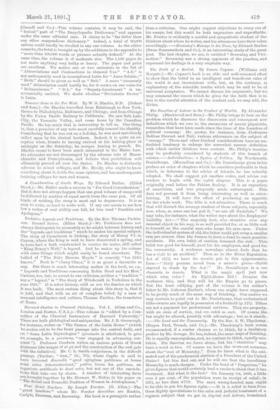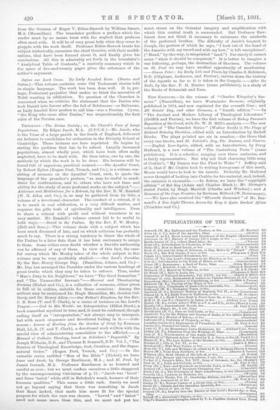The Function of Labour in the Product of Wealth. By
Alexander Philip. (Blackwood and Sons.)—Mr. Philip brings to bear on the problem which he discusses tho discoveries and consequent new definitions which we owe to the researches of recent physicists, researches that have been made since the time of the founders of political economy. He quotes, for instance, from Professors Balfour Stewart and Tait, various utterances on the subject of "energy." These and other kindred considerations have an un- doubted tendency to enlarge the somewhat narrow definition with which earlier thinkers were content. Mr. Philip's treatise may be profitably considered by students of this branch of soience.—individuaiissa: a System of Politics. By Wordsworth IDonisthorpe. (Macmillan and Co.)—Mr. Donisthorpe gives in his preface an order of chapters which he considers preferable to that which, in deference to the advice of friends, he has actually adopted. We shall suggest yet another order, and advise our readers to begin with the eighth chapter. This is a paper originally road before the Fabian Society. It is an exposition. of anarchism, and was purposely made extravagant. This does not prevent it from being interesting as well as enter- taining. It will have the effect of producing an appetite for the whole work. The title is not attractive. There is much that will disturb the average student of these subjects, especially now, when, as some one has put it, "we are all Socialists." We may take, for instance, what the writer says about the Employers' Liability Act :—" The ungainly lout, who stumbles over any unusual object in his way, is as well provided for, at as little cost to himself, as the careful man who keeps his eyes open. Under the individualist system of old, the latter could put away a smaller sum per annum than the former to form a fund to moot possible accidents. His own habit of caution lessened the risk. This habit was good for himself, good for his employers, and good for the community. A workman nowadays almost feels that he has a right to an accident." Then as to the Mines Regulation Act of 1872, we have its results put in this epigrafroo toic form:-'-" Sixty persons saved from a miner's grave
starved to death by the Act 1" Mr. Donisthorpe is a vox clamamtis in deserto. What is the magic spell just now which wins votes ? An Eight-Hours Bill ! Promise the workmen this, and they will lot the Empire go to pieces. Not the least edifying part of the volume is the author's letter to Mr. Auboron Herbert, whom one might have supposed to be pretty much of the same way of thinking. One matter we may venture to point out to Mr. Donisthorpo, that ecclesiastical tithe-owners are legally in possession of a freehold (p.121). Tithes are not a payment for professional services. They are property, with an onus of service, and are rated as such. Of course the law might be altered, possibly with advantage ; but so it stands. —The Land and the Community. By the Rev. S. W. Thackeray. (Kogan Paul, Trench, and Co.)—Mr. Thaokeray's book cornea recommended, if a reader chooses so to think, by a laudatory preface by Mr. George. He has, indeed, the same ways of thinking. He is equally unscrupulous, and, we venture to think, equally mis- taken. His theories we leave alone, but his "statistics" may have a word or two. Of course we have the worn-out nonsense about the "cost of Monarchy." Does he know what is the esti- mated cost of the quadrennial election of a President of the United States ? Lot him find out, and he will see that the hereditary Monarchy is much cheaper. Under the head of "Pauperism," he gives figures that would certainly lead a reader to think that it has increased. But what is the fact ? On January 1st, 1889, a little over 8 per cent, of the population. were in receipt of relief ; in 1871, no less than 4'779. The most wrong-headed man ought to be able to get his figures right.—It is a relief to turn from these flighty speculations to the calm and judicial treatment of a cognate subject that we get in Capital and Labour, translated from the German of Euger V. Bohm-Bawerk by William Smart, MA. (Macmillan). The translator prefixes a preface which the reader must by no means treat with the neglect that prefaces often meet with. It will be of very great help when they come to grapple with the work itself. Professor Bohm-Bawerk treats his subject historically, examines the chief theories, with their modifi- cations, that have been formed about it, and finally gives his conclusions. All this is admirably sot forth in the translator's " Analytical Table of Contents," a masterly summary which in the space of five-and-twenty pages gives the substance of the author's argument.



































 Previous page
Previous page